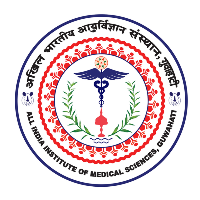
Department of Paediatrics, AIIMS Guwahati
The Department of Pediatrics at the All India Institute of Medical Sciences (AIIMS), Guwahati, is committed to delivering compassionate, comprehensive, and evidence-based pediatric healthcare. As a key pillar of the institute's vision for equitable health services in Northeast India, the department blends tertiary-level clinical care with academic rigor and research excellence to address the region's evolving pediatric health needs.
With a multidisciplinary approach, the department offers a wide array of services, including outpatient and inpatient care, specialty clinics, and advanced diagnostics such as Video EEG and NCV. Notably, the Child Development and Early Intervention Centre (CDEIC)—the first of its kind in Northeast India—provides integrated care for children with neurodevelopmental disorders such as autism, cerebral palsy, ADHD, and learning disabilities. The CDEIC brings together expertise in pediatrics, developmental medicine, psychiatry, psychology, speech and occupational therapy, physiotherapy, and special education to offer holistic, family-centered care.
In partnership with national health programs such as the Rashtriya Bal Swasthya Karyakram (RBSK) and the National Health Mission (NHM), the department actively engages in outreach programs and public health initiatives, emphasizing early detection, prevention, and inclusive care.
The department also plays a central role in the implementation of Competency-Based Medical Education (CBME), providing structured undergraduate and postgraduate training programs. With innovative teaching methods, active bedside mentoring, and simulation-based learning, the department seeks to nurture clinical acumen, research aptitude, and ethical practice among future pediatricians. The Department of Pediatrics at AIIMS Guwahati has taken a pioneering step by launching the first DM course in Pediatric Neurology in Northeast India, marking a significant advancement in subspecialty medical education in the region.
In research, the department maintains a strong academic presence with numerous publications in national and international journals, while also leading interdisciplinary, community-based, and funded projects.
Through its commitment to child-centered care, educational innovation, collaborative research, and community engagement, the Department of Pediatrics continues to strive towards excellence in service to children and families across Northeast India.
Vision
To become a leading center for pediatric care, medical education, and research in Northeast India, advancing child health with compassion, inclusivity, and scientific excellence.
Mission
Core Values
Curriculum
MD(PEDIATRICS)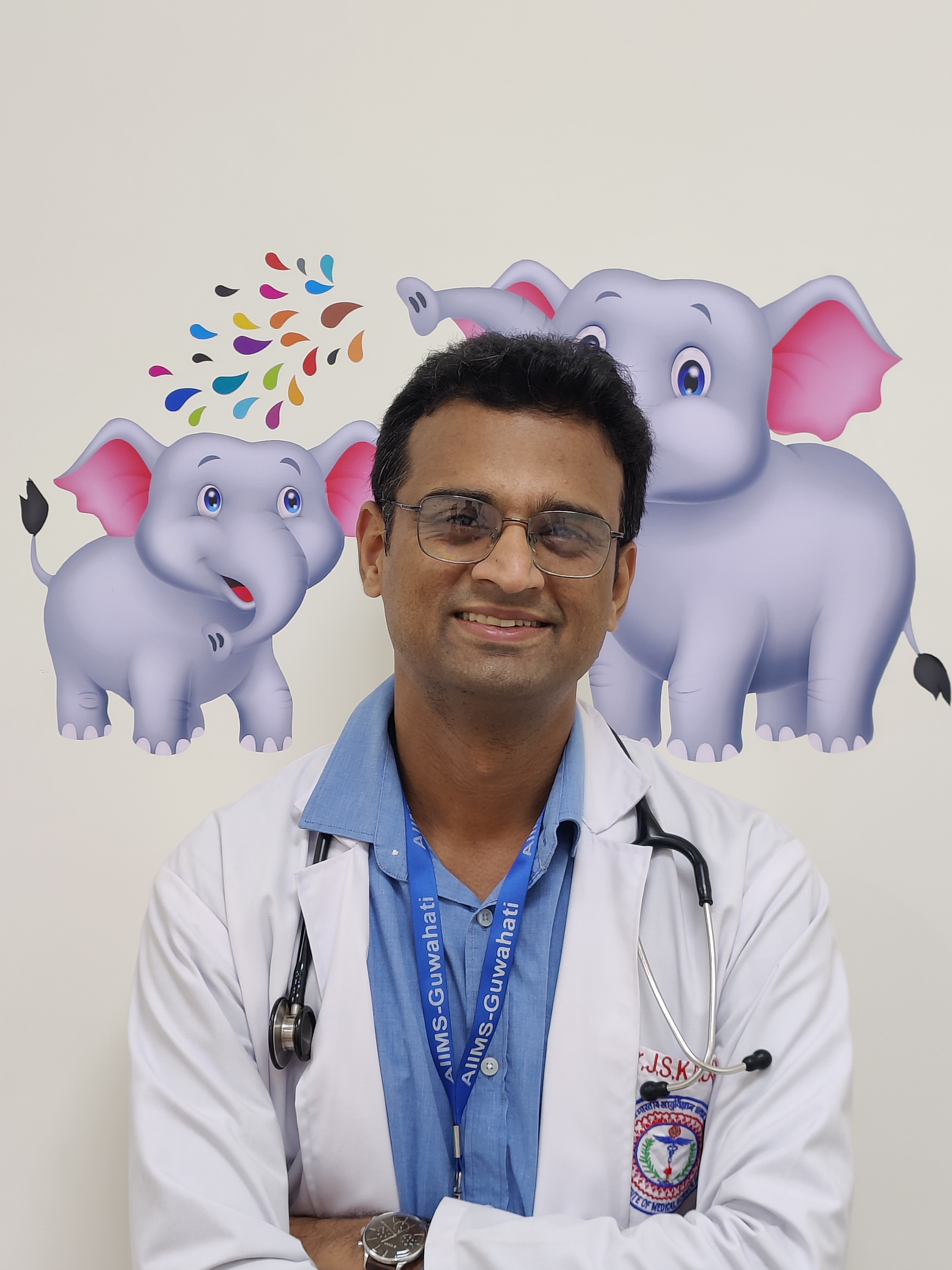
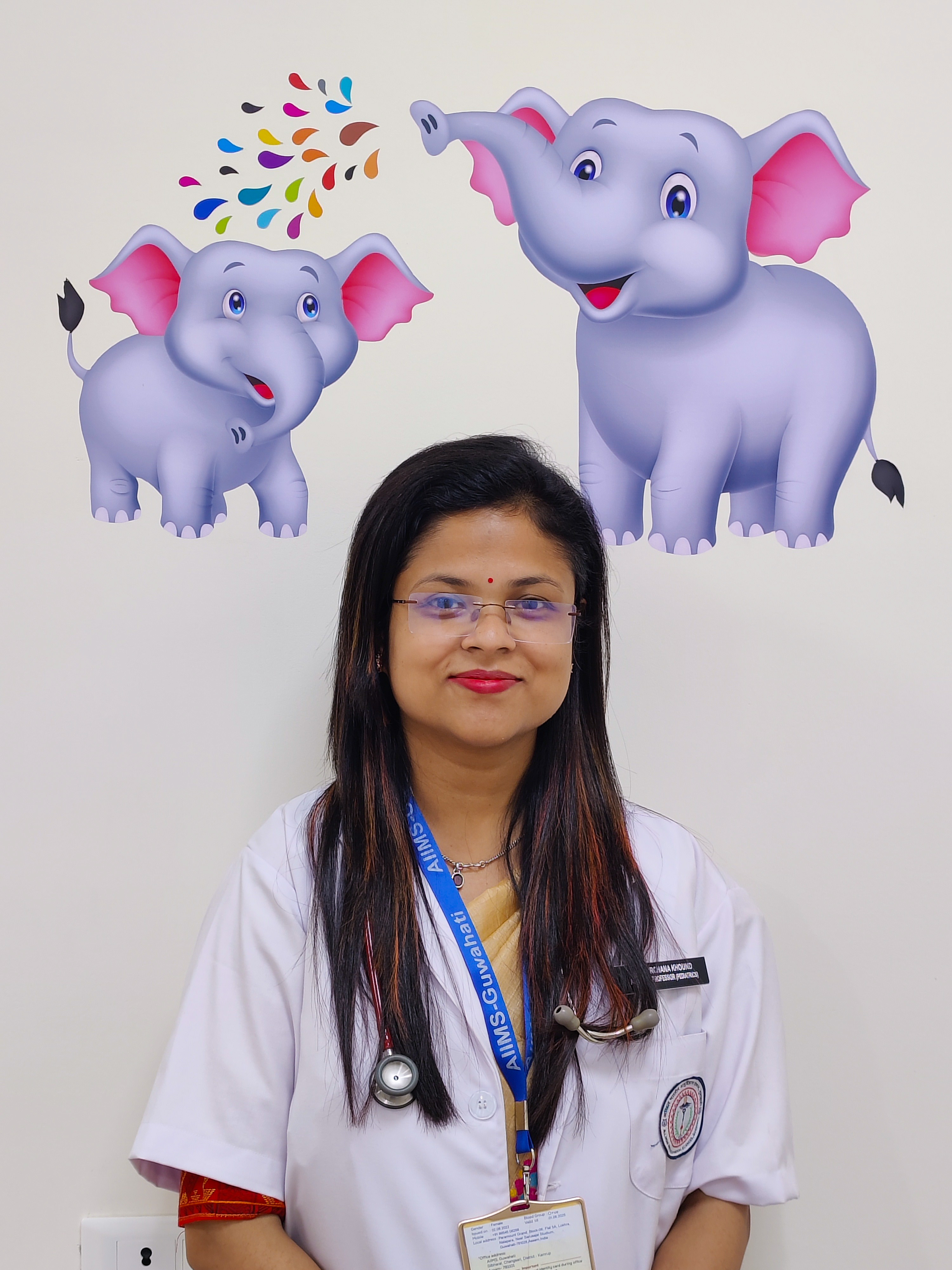
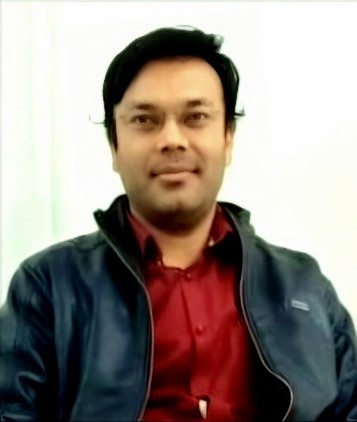
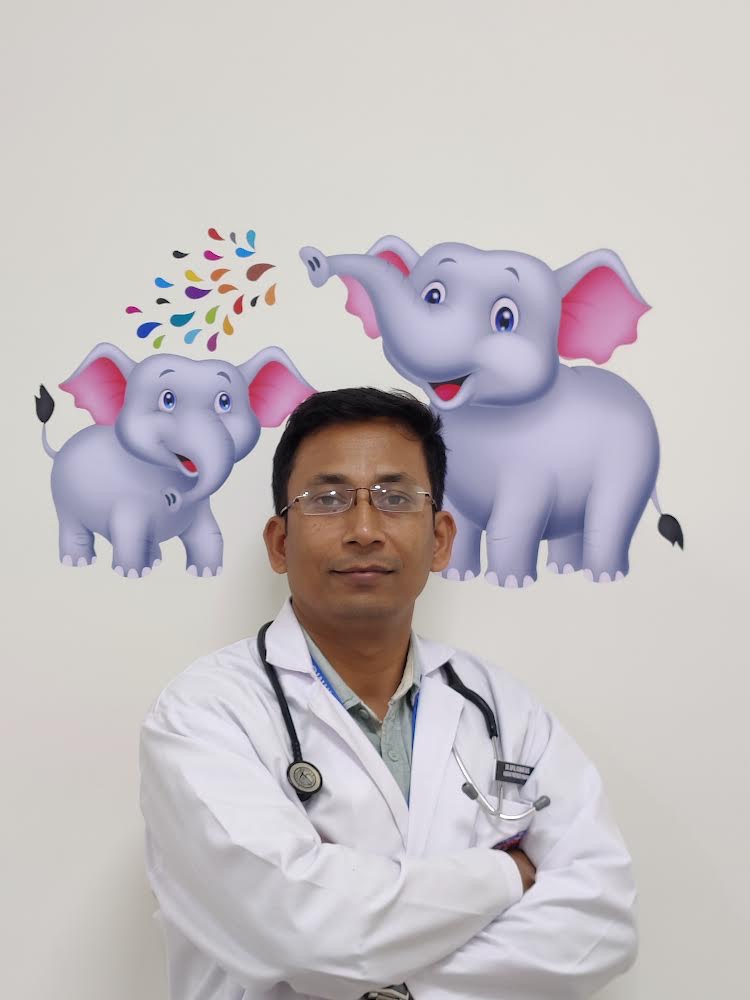
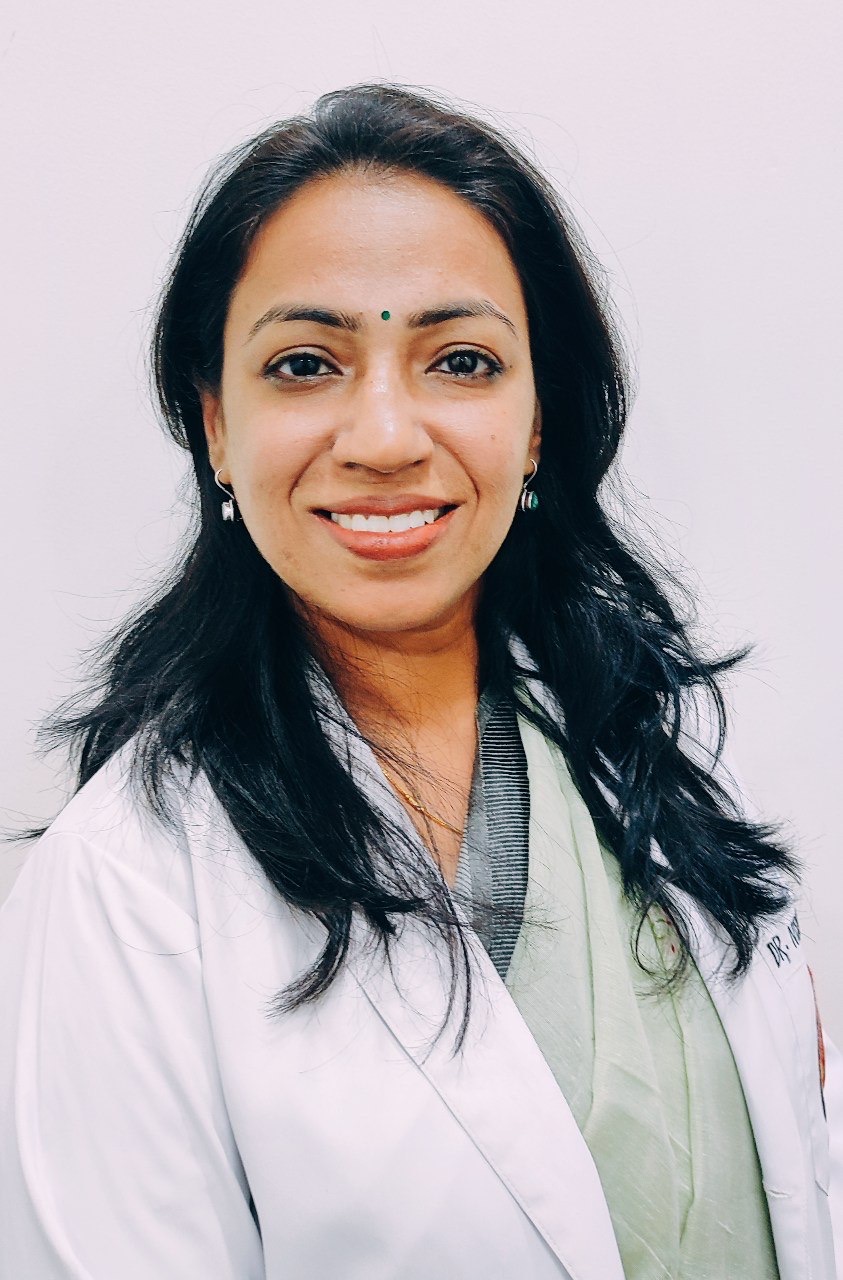
Events conducted by the department (2022-25)
The Department of Pediatrics at AIIMS Guwahati is steadily strengthening its infrastructure with the aim of offering comprehensive and compassionate pediatric healthcare. With a focus on both service and learning, the department provides an environment that supports clinical care, academic training, and diagnostic advancement. Its facilities have been thoughtfully developed to cater to the unique needs of children while contributing meaningfully to pediatric education and research in the region.
Clinical Infrastructure
Outpatient Department (OPD):
The Pediatric OPD functions six days a week, from Monday to Saturday, providing consultations for a wide range of pediatric concerns. Services include preventive care, immunization, growth monitoring, and follow-up consultations. Patient registration is open from 9:00 AM to 2:00 PM on weekdays, and until 12:00 Noon on Saturdays, ensuring accessibility for families across varied schedules.
Specialty Clinics
The Department of Pediatrics at AIIMS Guwahati has established a range of specialty clinics to cater to the unique and complex healthcare needs of children. These clinics are designed to provide focused, condition-specific care and are an essential part of the department’s patient-centered approach. In addition to regular OPD services, these specialty clinics ensure continuity of care, early intervention, and multidisciplinary management across pediatric subspecialties.
The following specialty clinics are currently operational:
These specialty services complement the department’s core clinical functions and reflect its commitment to delivering holistic, high-quality pediatric care. Clinic schedules are subject to periodic review for optimization and expansion based on community needs.
Inpatient Services:
The department houses a fully operational pediatric ward equipped to care for children admitted for various acute and chronic illnesses. The ward provides a child-friendly, family-centered environment, emphasizing comfort, safety, and evidence-based treatment protocols.
A Pediatric Intensive Care Unit (PICU) has recently been established to manage critically ill children requiring intensive monitoring and interventions. This addition marks a significant step in strengthening pediatric emergency care services in the Northeast region, where such specialized facilities have long been limited.
Neurophysiology and Diagnostic Facilities
To enhance diagnostic capabilities for neurological conditions, the department initiated a dedicated neurophysiology lab. The Video EEG facility, inaugurated in December 2023, enables detailed neurodiagnostic evaluation for conditions such as epilepsy and seizure disorders, significantly improving diagnostic accuracy and care planning.
Commissioned on Children’s Day (14th November 2024), the NCV machine supports evaluation of neuromuscular function, helping clinicians assess nerve and muscle health in children presenting with weakness, delayed milestones, or neuropathies.
Child Development and Early Intervention Centre (CDEIC)
The Child Development and Early Intervention Centre (CDEIC) at AIIMS Guwahati is the first comprehensive, multidisciplinary facility of its kind in Northeast India dedicated to the early identification, assessment, and holistic management of children with neurodevelopmental disorders (NDDs). Established in response to the growing need for coordinated care, the CDEIC aims to streamline the journey for families navigating the challenges of childhood disabilities by offering all essential services under one roof.
Background and Need
Neurodevelopmental disorders such as Autism Spectrum Disorder (ASD), Attention Deficit Hyperactivity Disorder (ADHD), cerebral palsy, intellectual disabilities, and learning disorders are increasingly recognized in early childhood. As per the World Report on Disability (WHO & World Bank, 2011), around 15% of the population experiences some form of disability. In the Northeast region of India, this translates to approximately 970,000 individuals with significant functional limitations requiring continuous rehabilitative support.
Parents of children with NDDs often face the burden of visiting multiple departments—neurology, psychiatry, physiotherapy, occupational therapy, and speech therapy—without coordinated care. This fragmentation contributes to delays in diagnosis and intervention, caregiver fatigue, and inconsistent treatment outcomes. The CDEIC at AIIMS Guwahati has been established to address this gap through integrated, child- and parent-friendly services.
Services Offered
CDEIC provides a full continuum of care through the following services:
Multidisciplinary Team
The CDEIC is led by a core team of specialists who bring their respective expertise to ensure comprehensive, individualized care:
Child Psychiatrist
Provides child-focused psychiatric assessments and therapeutic management of behavioral and emotional disorders. Utilizes a biopsychosocial model for ADHD, autism, and related conditions. Ensures timely interventions while liaising with pediatric and neurology teams.
Developmental Pediatrician / Pediatric Neurologist
Specializes in diagnosing and managing complex neurodevelopmental disorders, including epilepsy, cerebral palsy, and global developmental delays. Plays a central role in forming individualized medical and rehabilitation plans in coordination with other disciplines.
Clinical Psychologist
Conducts standardized cognitive, emotional, and behavioral assessments. Provides therapeutic interventions such as CBT, play therapy, and behavioral modification strategies tailored to the child’s needs. Supports families in navigating behavioral challenges and promotes resilience.
Occupational Therapist
Focuses on improving fine motor skills, sensory processing, self-care tasks, and daily functional independence. Guides parents on environmental adaptations and supports inclusive development.
Speech-Language Pathologist (SLP)
Evaluates and manages speech, language, communication, and feeding disorders. Delivers early intervention to support social communication, verbal expression, and swallowing safety. Offers individualized therapy plans and parental guidance.
Special Educator
Supports cognitive, emotional, and behavioral development through individualized education plans. Trains families in using learning aids and helps children transition into inclusive educational settings.
Physiotherapist
Provides therapy to enhance motor skills, balance, and coordination. Uses evidence-based techniques such as Neurodevelopmental Therapy (NDT) and Proprioceptive Neuromuscular Facilitation (PNF). Aims to improve posture, gait, and functional independence in everyday activities.
Integration with RBSK Services
CDEIC has been formally linked with the Rashtriya Bal Swasthya Karyakram (RBSK) as per approval dated 12.01.2024 (NHM-35017/11/2023-RBSK-NHM). Through this program, children diagnosed with eligible conditions such as cerebral palsy, intellectual disabilities, speech and language delays, and autism receive free, comprehensive care, further enhancing accessibility for underserved families.
Educational and Training Facilities
Demonstration Rooms and Seminar Halls:
Designed to support clinical education, these rooms are equipped with modern audio-visual tools and are routinely used for lectures, case-based discussions, journal clubs, and hands-on demonstrations for undergraduate and postgraduate students.
Simulation Laboratory In AIIMS Guwahati :
A state-of-the-art high-fidelity simulation laboratory has been developed at AIIMS Guwahati to enhance clinical training in a structured and safe environment. The Department of Pediatrics, in collaboration with other clinical departments, actively utilizes this facility to provide medical students and residents with hands-on experience in managing neonatal emergencies, performing neonatal resuscitation, and practicing essential life-saving procedures. The simulation lab enables scenario-based learning that bridges theoretical knowledge with real-world clinical application, fostering both confidence and competence in future healthcare professionals.
Support Services
Teleconsultation Services:
To improve accessibility to pediatric expertise in remote and underserved regions, the department provides teleconsultation services from Monday to Saturday. This initiative has proven vital in extending care to families who are unable to visit the facility in person and supports continuity of care for children with chronic or complex conditions.
The Department of Pediatrics, AIIMS Guwahati, remains committed to enhancing its infrastructure to support its mission of providing high-quality, accessible pediatric care. By gradually building on its clinical, diagnostic, and educational capacities, the department envisions evolving into a regional center of excellence in child health.
Compiled list of all the publications from the Department for the year 2023- 25
Book Chapters / Books
Ongoing Funded Projects
The Department of Pediatrics at AIIMS Guwahati continues to pursue impactful research through both external and internal funding sources, focusing on improving pediatric and neurodevelopmental outcomes. The following projects are currently in progress:
The Department of Pediatrics at AIIMS Guwahati serves as a cornerstone for child health services in Northeast India, delivering a full continuum of care for infants, children, and adolescents. The department addresses a broad range of pediatric health needs—from common childhood illnesses to complex neurodevelopmental and chronic disorders—through a combination of outpatient, inpatient, and critical care services. Guided by a multidisciplinary approach, clinical care is underpinned by advanced diagnostic capabilities and a compassionate, child- and family-centered philosophy.
Outpatient Department (OPD)
Operating six days a week (Monday to Saturday), the Pediatric OPD offers comprehensive care that includes:
The department also provides teleconsultation services to extend pediatric expertise to remote and underserved communities, ensuring equitable access to high-quality healthcare.
Specialty Clinics
Dedicated pediatric specialty clinics are held throughout the week to provide expert evaluation and longitudinal management for complex or chronic conditions:
These clinics enable focused, multidisciplinary care and support early intervention, with seamless referrals to inpatient and allied services when needed.
Inpatient Department (IPD)
The Pediatric Ward offers inpatient care for children requiring medical admission, providing:
In 2024–25, the department recorded 804 inpatient admissions, with neurological conditions being the most frequent cause of hospitalization.
Pediatric Intensive Care Unit (PICU)
A recently established PICU strengthens emergency and high-dependency care capacity within the region. It is equipped with:
The PICU enhances the department’s ability to manage critically ill children requiring continuous monitoring and advanced life support.
Neurophysiology and Diagnostics
Advanced neurodiagnostic services support precise diagnosis and monitoring:
Child Development and Early Intervention Centre (CDEIC)
Integrated within the department, the CDEIC is the first comprehensive facility in Northeast India offering multidisciplinary assessment and therapy for children with neurodevelopmental disorders including autism, ADHD, cerebral palsy, and global developmental delays. Services include:
Teleconsultation Services
To bridge the healthcare gap for children in remote and underserved areas, the Department of Pediatrics at AIIMS Guwahati provides regular teleconsultation services, operational from Monday to Saturday. This platform ensures continuity of care for children with chronic illnesses, post-discharge follow-up, and neurodevelopmental disorders, particularly those enrolled under CDEIC and RBSK-linked services. Through audio-visual consultations and electronic record access, pediatricians can offer real-time clinical guidance, prescription updates, and parental counseling—improving accessibility and reducing the burden of travel for families across Northeast India.
Community Outreach and Public Health Initiatives
The department's clinical engagement extends well beyond institutional walls. Between April 2024 and March 2025, several community-based programs were conducted:
Each initiative reflects the department’s strong focus on early identification, inclusive care, and health literacy, ensuring that clinical excellence is matched by community responsiveness.
Patient Statistics
Since its inception, the Department of Pediatrics at AIIMS Guwahati has progressively evolved into a key center for pediatric care in Northeast India, demonstrating consistent growth in both outpatient and inpatient service utilization. The following section presents a year-wise overview of patient care metrics.
Cumulative OPD Statistics (01.04.2023 – 31.03.2025):
Cumulative IPD Statistics (01.04.2023 – 31.03.2025):
The Department of Pediatrics at AIIMS Guwahati is deeply committed to nurturing the next generation of pediatricians, pediatric neurologists, and allied health professionals through a blend of rigorous academic instruction, bedside mentorship, and skills-based simulation learning.
Undergraduate Medical Education
The department actively contributes to the MBBS curriculum in alignment with the principles of Competency-Based Medical Education (CBME) as mandated by the National Medical Commission. Teaching is delivered through:
Students are also oriented to special units such as the Child Development and Early Intervention Centre (CDEIC), enhancing awareness of neurodevelopmental care from the undergraduate level.
Postgraduate Medical Education
The department offers an MD program in Pediatrics, focusing on the development of strong clinical reasoning, procedural skills, and ethical pediatric practice. Key features include:
Postgraduates are also involved in community engagement programs and public awareness campaigns, helping them develop as socially responsible clinicians.
Super-Specialty Training: DM Pediatric Neurology
AIIMS Guwahati offers the first DM Pediatric Neurology course in Northeast India, reflecting a landmark advancement in subspecialty training in the region. The program aims to produce academic neurologists with expertise in:
The curriculum emphasizes clinical excellence, research leadership, and teaching acumen, preparing trainees to serve as future leaders in pediatric neurology.
Simulation-Based Learning
In collaboration with the institutional simulation lab, the department delivers high-fidelity, scenario-based training sessions for both undergraduate and postgraduate students. These include:
Simulation training fosters clinical competence and confidence in a risk-free environment, enhancing patient safety and care outcomes.
Faculty Development and Continuing Medical Education (CME)
The Department of Pediatrics at AIIMS Guwahati places strong emphasis on lifelong learning and skill advancement through structured faculty development programs and continuing medical education (CME) initiatives. These programs are strategically designed not only to foster academic growth within the institution but also to build healthcare capacity in the broader community, particularly in underserved and rural regions of Northeast India.
Faculty Development Initiatives
Faculty members are actively encouraged to participate in professional development programs focusing on:
These efforts aim to ensure that the faculty remain not only skilled clinicians but also effective educators and academic leaders, upholding the highest standards of pediatric training.
CME Activities and Thematic Workshops
The department has organized a robust calendar of regional and national CME programs, with key focus areas including:
These CMEs have drawn wide participation from pediatricians, postgraduate trainees, general practitioners, and allied health professionals from across the region.
Training Peripheral Health Workers and Community Stakeholders
A defining feature of the department’s outreach has been its commitment to capacity building among grassroots healthcare providers, recognizing their pivotal role in early identification and referral of pediatric and developmental conditions. The department has conducted specialized training programs for:
These workshops are conducted both on-campus and in peripheral settings, utilizing interactive teaching, IEC materials, and hands-on demonstrations. Such engagements have been instrumental in strengthening the continuum of pediatric care from community to tertiary center, aligning with national health priorities.
Capacity Building Through Research and Publication Training
Recognizing the role of research in evidence-based care, the department also organizes:
These initiatives aim to cultivate a research-oriented mindset among residents, junior faculty, and collaborators, empowering them to contribute meaningfully to the body of pediatric knowledge.
Together, these teaching, training, and outreach activities underscore the department’s dual commitment to academic excellence and community empowerment, positioning AIIMS Guwahati as a growing hub for pediatric education, service, and innovation in Northeast India.